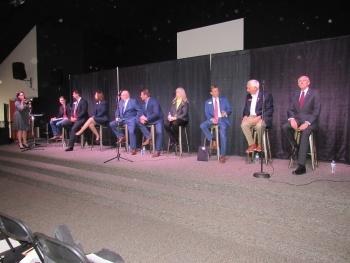 A new congressional seat in North Carolina is getting much attention from political hopefuls and resident politicians. Congressional District 4 will now encompass Cumberland County, Sampson County, Johnston County, most of Harnett County, and a section of Wayne County.
A new congressional seat in North Carolina is getting much attention from political hopefuls and resident politicians. Congressional District 4 will now encompass Cumberland County, Sampson County, Johnston County, most of Harnett County, and a section of Wayne County.
Many Republican candidates have thrown their names into the hat, hoping to become the Representative for the new district. This past Saturday, the Cumberland County GOP hosted a forum for ten candidates to discuss crucial issues and introduce themselves to voters in Fayetteville. Nine of the candidates were present, as Christine Villaverde was unable to come due to a case of pneumonia; however, her campaign team was in attendance.
Some of the issues discussed were national, such as opinions on federalizing the elections, solving the problem of illegal immigration, becoming energy independent, the security threat of China, and how the federal government can address the rising crime.
Other questions were more individualized, like which committees they would want to serve on and who they would support for a House Speaker.
Michael Andriani
Andriani is a newcomer to politics and recently resigned from the U.S. Army after refusing to get the COVID-19 vaccine. He did request to get a religious exemption, however, that was denied. Andriani was commissioned as an Army officer and graduated from the Virginia Military Institute with a degree in history.
Andriani did not indicate who he would support for Speaker of the House but did throw out the suggestion it should be former President Donald Trump.
Andriani did say his priorities would be to defend the Constitution and enforce the law.
When it comes to being energy independent, he believes that the U.S. should look at multiple energy sources, particularly nuclear energy.
DeVan Barbour
Barbour, a native of Johnston County, has worked as a delegate for the Republican National Convention, but this is his first time running for office. He co-founded Cornerstone Employee Benefits and previously worked for Pierce Group Benefits. He is running a campaign as "one of the people."
He says he is a conservative Republican and wants to vote for conservative values. When it comes to the Speaker of the House, he says he will see who Trump endorses and would like to serve on the House Agriculture Committee or the House Armed Services Committee.
While he is not a fan of federalizing elections, he says he wants to look into a national voter I.D. system and a federal ban on ballot drop-off boxes. He also believes that the border wall needs to be finished, and he would like to see an end to all catch-and-release programs.
Rene Borghese
Borghese worked for 31 years as a nurse and is currently the Director for Logistics of the Air Medical Program for Duke Life Flight. She says she decided to run for the first time because she wants to see conservative values return to the country.
She would like to see streamlining in the government and create better communication between local/state governments and the federal government.
For Speaker of the House, she says she will vote for someone who shows up and votes and not someone who makes behind-the-door deals with lobby groups. She would like to serve on the House Committee on Appropriations and focus on healthcare due to her experience in that field.
She said she would like America to be more independent with energy and economics and be less dependent on China. She raises concerns about outsourcing jobs and the purchasing of companies and their properties by China-owned companies. She says you can't put the cart before the horse for energy independence, which she believes President Joe Biden has done with shutting down the Keystone Pipeline.
Bill Brewster
Brewster is a veteran from Charlotte but now lives in this seat's area for his business. He previously ran in the 2020 election for the U.S. House North Carolina District 12 but was disqualified after not paying his filing fee. He also launched his 2022 campaign for District 13 before the new redistricting map was published.
He says that the U.S. Government needs leadership with character, motivation and dedication. When asked about who he would support for Speaker of the House, he said it should be someone younger with vitality and not someone like Mitch McConnell - who currently serves in the U.S. Senate. He also stated that he would be interested in serving on the House Agriculture Committee and would like to work on a committee regarding business or one that helps veterans.
When it comes to federalizing elections, he said he would support a federal voter I.D. law, but everything else should be left to the state to decide on election law.
Tony Cowden
Cowden is a veteran and business owner in Sampson County. He is new to the political world; this is the first elected seat he has run for.
He says his decisions and core principles are based on the ten commandments, the constitution and constituents and announced that he would only serve four terms if he were to be elected.
Cowden says he won't vote for someone who compromises with the left when choosing the next Speaker of the House. If elected, he says he would like to serve on the House Agriculture Committee, House Homeland Security Committee, or the House Armed Services Committee. He did bring up concerns over barracks living and how the House could improve the lives of service members.
When it came to energy independence and illegal immigration, he believes America can resolve these two issues if the U.S. decides to invest more in our southern neighbors than Europe or the Middle East. He says we should focus on becoming a stronger hemisphere rather than worry about issues halfway across the globe. By investing in countries to our south, we could help support jobs that deter immigration to the U.S.
Renee Ellmers
Ellmers is no stranger to Cumberland County. She served as the U.S. Representative for District 2 from 2011 to 2017, when Cumberland County fell in District 2. She previously served on the Energy and Commerce Committee, House Agriculture Committee, the Foreign Affairs Committee and the Small Business Committee. She was endorsed by Trump in 2016.
Ellmers says she doesn't want to name anyone at the moment for a possible Speaker of the House but says she will pay close attention to the person's staff and who they pick to work with them. She also said she is open to someone new who may be running in the 2022 elections.
If she were to be elected, she would focus on ending the Green New Deal and help support an American Parents Bill of Rights that would allow parents to have the right to know what curriculum is being taught to their children and have a say in it.
She stated that she does not view President Joe Biden as a legitimate president but is against federalizing election law. She would help support Voter ID and Picture ID laws but it should be left up to the states.
Nat Robertson
Robertson is a familiar face to Fayetteville natives as Fayetteville's former Mayor. He was also appointed to the Trump White House Roundtable on Infrastructure, the North Carolina Governors Crime Commission under Pat McCrory, N.C. League of Municipalities, The Task Force on Veteran Homelessness, the Task Force on Opioid Addiction Awareness and the Fayetteville Police Foundation.
When it comes to the Speaker of the House, Robertson says he will listen to what the Republican leadership says and go with them. He said that making those connections early on would help him pass legislation later. He also said that he would be interested in serving on a committee that would work for veterans.
He says he is not a fan of big government and believes many issues, such as crime and elections, should be done on a state and local level.
He also emphasized family values throughout the forum. However, he says he is concerned that China-owned companies compromise those values.
Alan Swain
Swain is a veteran who previously worked at the White House under Presidents Bill Clinton and George W. Bush as the Executive Officer to the White House Drug Czar. He told people at the forum that he knows D.C. and is a fighter.
He stated that he would have concerns if Kevin McCarthy was elected as House Speaker and be more comfortable voting for Steve Scalise. However, if Scalise doesn't run for House Speaker, Swain said he would also look at Jim Banks, a well-liked fresh face.
Swain also noted that he would be interested in serving on the House Oversight Committee, House Judiciary Committee and the House Armed Services Committee. However, he did mention that he would want term limits and would pass that if voted on.
He is worried about illegal immigration and how many federal departments are becoming biased and not enforcing what they are sworn to do, like the Departments of Justice, Health and Human Services and Homeland Security. He also noted that China is one of the U.S.'s most significant enemies, and we need to be more prepared in defense against them.
John Szoka
Szoka is a veteran and is currently a representative for North Carolina House District 45 and has been in that seat since 2013. He is currently serving on the Banking Committee, Election Law and Campaign Finance Reform Committee, Energy and Public Utilities Committee, House Finance Committee, Health Committee, House Redistricting Committee and the Rules, Calendar and Operations of the House Committee.
Szoka says he currently has no favorite pick for a possible House Speaker and says that the Republican Party needs to focus on having a successful election. He would be interested in serving on the Armed Services Committee or the Energy and Commerce Committee.
He believes in making sure no federal law passes regarding state elections, even relating to Voter ID. However, he said the most significant impact that voters will have on election law is the upcoming fall election of the State Supreme Court.
Like the other candidates, he believes that the pipeline should reopen to secure energy independence. However, while companies should work towards sustainable energy, no mandates should force them to follow sustainable energy options.
He also noted that the United States needs to maintain a strong military force, especially against China and Russia.
He says he is concerned about online security, and that needs to be a more prominent topic on how to stop electronic hacks on our government.

Following the forum, the Cumberland County GOP Chapter held a straw poll, both in-person and online.
The top candidates for the in-house straw poll were Barbour, polling at 25.6%, Szoka, polling at 23.3%, and Cowden, polling at 20.9%. The people at the bottom of the poll were Brewster, Andriani and Borghese.
The Primary Election will take place on May 17.